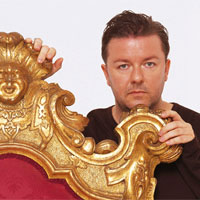Ricky Gervais Quitting Comedy?
Filed Under Sitcom
 It seems inevitable for comedians to do something else but comedy at some point in their careers. The desire for approval is so great in performers, that comedy, which lacks awards and recognition much of the time, has to be foresaken to prove that the comedian has more skills than making silly faces, falling down on command and acting embarassed at the accidental inappopriate sexual comment. (This only applies to comedy performers. Comedy writers fortunately never get this urge, probably because the need for approval isn’t a part of their makeup. In fact, it’s often the opposite.)
It seems inevitable for comedians to do something else but comedy at some point in their careers. The desire for approval is so great in performers, that comedy, which lacks awards and recognition much of the time, has to be foresaken to prove that the comedian has more skills than making silly faces, falling down on command and acting embarassed at the accidental inappopriate sexual comment. (This only applies to comedy performers. Comedy writers fortunately never get this urge, probably because the need for approval isn’t a part of their makeup. In fact, it’s often the opposite.)
So I get it the reports that Ricky Gervais has “quit comedy.” As far as I can tell, those are their words, not his. But in descriping the intentions of him and his writing partner Stephen Merchant after the second season of their sitcom Extras, Gervais said:
“This will probably be the last sitcom we do. We’d like to do drama… We’d like to do something with more weight, like The Sopranos maybe — not necessarily crime but something meaty. Revenge is the best theme.”
My thoughts: that’s awesome. I’d love to see what Gervais and Merchant come up with. They’re brilliant creators and I trust them to see what they could come up with.
What I’m disappointed are the terms “meaty” or ‘weight” used to describe drama and not comedy. Extras is easy to dismiss as flighty since it focuses on the entertainment industry. But the take Gervais has on the desperation to be seen and noticed has a great deal of relevance in a culture where increasing, all of us, thanks to reality TV, talking head nostalgia, blogging and YouTube are told we can have not just fifteen minutes of fame but fifteen minutes from others talking about our infamy and then another fifteen minutes from ourselves talking about others’ infamy. It’s a brass ring that so many aspire to now that Extras, though another comedy about entertainment, has something to say about life too.
But The Office I would argue is probably the meatiest show of the decade, more so than the Sorpranos because it’s about a world which most of us live in. We’re not mafia dons or molls, we’re trying to get by and find a way to do something for eight hours a day that we’d rather not be doing. Examining the depths of that and finding the little victories we have to escape it is far more telling to life. The Sorpranos, for all the darkness and desperation it shows, is escapism for most. The bloodthirsty audience desperate for the next whacking misses out on the message of how mundane crime is. They appreciate the sauce, not the meat. The British Office with all of its bits buffered by the sounds of photocopiers and telephones, we’re surrounded by the oppressive weight of a shitty, shitty job.
“Meaty” and “weight” have nothing to do with genre and everything to do with recognition. I don’t believe in awards for comedy… when you focus on deflating authority, you shouldn’t expect to be raised up just as high. But the image problem that drives great talents like Gervais to “quit” comedy makes me question that belief.

Here! Here!